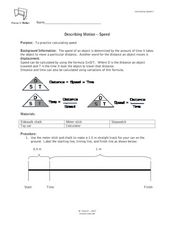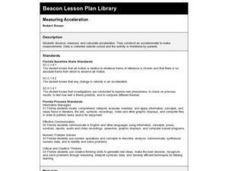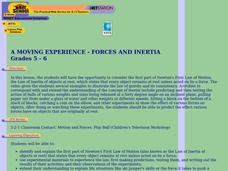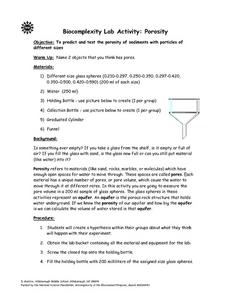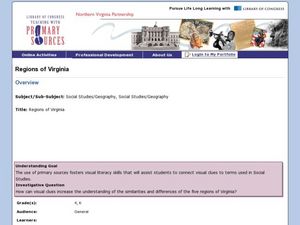Curated OER
Feeling Pressured
Students explore pressure in our atmosphere. They examine the relationship between pressure and depth. Students construct an experimental apparatus and take measurements. Students evaluate the impact of pressure on the lungs.
Curated OER
China
Students participate in a instructional activity that is focused on the culture of China. The unit is set up using the layered curriculum method which is student centered. They pick the type of activities and assessments.
Curated OER
Describing Motion-Speed
Students study speed and learn how to calculate it. In this investigative lesson students participate in an activity that shows them how to calculate speed then they fill out a worksheet.
Curated OER
Fitness/Strength Conditioning Mini-lesson
Students describe a piece of strength conditioning equipment, what muscle (or muscles) are isolated, and how strengthening this muscle improve skill performance in the unit they are presently taking.
Curated OER
Sportsmanship and Spectator Behavior
Sixth graders listen to the story BEING A BAD SPORT as teacher reads to the class. They identify good and bad sportsmanship by reading and writing activities. They then go to the gym and simulate a game situation recording examples of...
Curated OER
Get Your Facts Right!
Students explore the life and the contributions of Christopher Columbus. In this Exploration Age lesson plan, students participate in several activities regarding the explorer. Students use the Internet and print resources to research...
Curated OER
Main Ideas Of Artists
Students explore the main idea and stories behind paintings. In this art lesson plan, students discuss how paintings tell stories and take tests based on details of paintings. The tests are embedded in the plan. Links that students...
Curated OER
On the Microbe Trail: An Introduction to Bacteria and Aseptic Technique
Tenth graders predict the conditions necessary for bacterial growth, test their predictions and at the same time practice the aseptic techniques and safety procedures needed when working with bacteria.
Curated OER
Measuring Acceleration
Students create an accelerometer and take measurements of acceleration in a moving car. They study the car speeding up in a straight line, slowing in a straight line and curving at constant speed. They prepare a lab report showing...
Curated OER
Main Idea and Supporting Details
Students identify main idea and supporting details from a short reading selection using a two-column note taking process. In this literacy lesson, students work in groups of three to four, then compare their papers with the other groups'...
Curated OER
Halloween Crafts and Games
Students access a variety of Halloween themed websites. They locate information on crafts, games and activities relating to Halloween. They complete world problems, write poetry and test reading comprehension.
Curated OER
Healthy Decision Making Towards Alcohol and Tobacco Use
Students examine and demonstrate refusal skills of smoking and drinking alcohol. They take a quiz, identify alternative activities to smoking and drinking, write a journal entry, and design an anti-smoking and anti-alcohol ad.
Curated OER
Election Vocabulary Brainstorm
Students participate in numerous activities pertaining to elections. They study election vocabulary and generate questions about campaigns and elections. They paraphrase articles and generate a class vocabulary list.
Curated OER
The Heart
Students explore the structures in the heart and follow the path of blood through the heart and lung. They copy the Fill-in-the blank notes from the colored folders that are located at the stations throught the room. Students are...
Curated OER
Science of Money
Students observe oxidation reaction in the lab using copper pennies. In this chemistry lesson, students examine a $1 dollar bill and record their observations. They explain how to identify counterfeit money using the iodine test.
Curated OER
Better Weight
Students investigate a Biblical based weight loss program which asks them to read, take on-line quizzes and tests, assess their level of physical activity, explore nutrition and food guidelines and determine whether weight loss would be...
Curated OER
Monitoring Energy Expenditure
Students use heart rate monitors and complete a swimming and running test. These tests allow students to obtain personal data, to manipulate the data through calculations of various parameters, and to graphically represent the data.
Curated OER
A Moving Experience - Forces and Inertia
Students view a video and complete corresponding activities to observe inertia. They observe and predict the effect various forces have on objects.
Curated OER
The Nutritional Content of Food
Students are given three unknown samples and must perform two chemical tests in order to determine if the samples contains protein and/or starch. Students work with corrosive or toxic reagents.
Curated OER
Energy Conversion
Sixth graders study energy conversions. They watch a demonstration of a working engine and make a chart explaining the energy conversions taking place. They build a simple electric motor and research other types of electric generators.
Curated OER
Tech It or Leave It
Students define "status symbol" and identify such items. They discuss the purpose of beta testing new technologies. They examine new ways that current technology is tested and publicized. They work in groups to develop proposals for...
Curated OER
Porosity
Young scholars predict and test the porosity of sediments with particles of different sizes. They name two objects that they think has pores. Students define the term porosity and pores. They comprehend that an aquifer is the porous...
Curated OER
Regions of Virginia
Fourth graders research an assigned region of Virginia. They work in groups to create a PowerPoint presentation. They present their information to the class. Students are tested on the information from their region as well as the regions...
Curated OER
The Crucible
Students participate in a layered curriculum unit. Credit is earned for learning, which comes about through listening, discussion, reading, and/or doing. They are verbally assessed for each activity chosen to complete.




